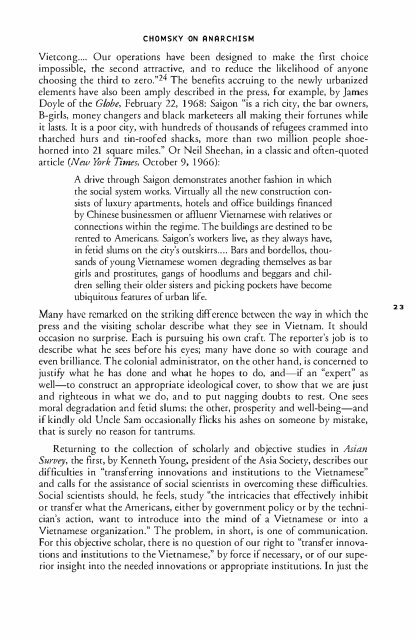Chomsky on Anarchism.pdf - Zine Library
Chomsky on Anarchism.pdf - Zine Library
Chomsky on Anarchism.pdf - Zine Library
You also want an ePaper? Increase the reach of your titles
YUMPU automatically turns print PDFs into web optimized ePapers that Google loves.
CHOMSKY ON ANARCHISM<br />
Vietc<strong>on</strong>g.... Our operati<strong>on</strong>s have been designed to make the first choice<br />
impossible, the sec<strong>on</strong>d attractive, and to reduce the likelihood of any<strong>on</strong>e<br />
choosing the third to zero."24 The benefits accruing to the newly urbanized<br />
elements have also been amply described in the press, for example, by James<br />
Doyle of the Globe, February 22, 1968: Saig<strong>on</strong> "is a rich city, the bar owners,<br />
B-girls, m<strong>on</strong>ey changers and black marketeers all making their fo rtunes while<br />
it lasts. It is a poor city, with hundreds of thousands of refugees crammed into<br />
thatched hurs and tin-roofed shacks, more than two milli<strong>on</strong> people shoehorned<br />
inro 21 square miles." Or Neil Sheehan, in a classic and olten-quoted<br />
article (New York Times. October 9. 1966):<br />
A drive through Saig<strong>on</strong> dem<strong>on</strong>strates another fashi<strong>on</strong> in which<br />
the social system works. Virtually all the new c<strong>on</strong>structi<strong>on</strong> c<strong>on</strong>sists<br />
of luxury apartments, hotels and office buildings financed<br />
by Chinese businessmen or affiuenr Vietnamese with rdatives or<br />
c<strong>on</strong>necti<strong>on</strong>s within the regime. The buildings are destined to be<br />
rented to Americans. Saig<strong>on</strong>'s workers live, as they always have,<br />
in fetid slums <strong>on</strong> the city's outskirrs .... Bars and bordellos, thousands<br />
of young Vietnamese women degrading themselves as bar<br />
girls and prostitutes, gangs of hoodlums and beggars and children<br />
selling their older sisters and picking pockets have become<br />
ubiquitous features of urban life.<br />
Many have remarked <strong>on</strong> the striking difference between the way in which the<br />
press and rhe visiting scholar describe what they see in Vietnam. It should<br />
occasi<strong>on</strong> no surprise. Each is pursuing his own craft. The reporter's job is to<br />
describe what he sees before his eyes; many have d<strong>on</strong>e so with courage and<br />
even brilliance. The col<strong>on</strong>ial administrator, <strong>on</strong> rhe other hand, is c<strong>on</strong>cerned to<br />
justifY what he has d<strong>on</strong>e and what he hopes to do, and-if an "expert" as<br />
well-to c<strong>on</strong>struct an appropriate ideological cover, to show (hat we are just<br />
and righteous in what we do, and to pur nagging doubts to rest. One sees<br />
moral degradati<strong>on</strong> and fetid slums; the other, prosperity and well-being-and<br />
if kindly old Uncle Sam occasi<strong>on</strong>ally flicks his ashes <strong>on</strong> some<strong>on</strong>e by mistake,<br />
that is surely no reas<strong>on</strong> fo r tantrums.<br />
Returning to the collecti<strong>on</strong> of scholarly and objective studies in Asian<br />
Survey, the first, by Kenneth Young. president of the Asia Society, describes our<br />
difficulties in "transferring innovati<strong>on</strong>s and instituti<strong>on</strong>s to the Vietnamese"<br />
and calls for the assistance of social scientists in overcoming these difficulties.<br />
Social scientists should, he feels, study "the intricacies that effectively inhibit<br />
or transfer what the Americans, either by government policy or by rhe technician's<br />
acti<strong>on</strong>, want to introduce into the mind of a Vietnamese or into a<br />
Vietnamese organizati<strong>on</strong>." The problem, in short, is <strong>on</strong>e of communicati<strong>on</strong>.<br />
For this objective scholar, there is no questi<strong>on</strong> of our right to "transfer innovati<strong>on</strong>s<br />
and instituti<strong>on</strong>s to the Vietnamese," by fo rce if necessary, or of our superior<br />
insight into the needed innovati<strong>on</strong>s or appropriate instituti<strong>on</strong>s. In JUSt the<br />
23

















